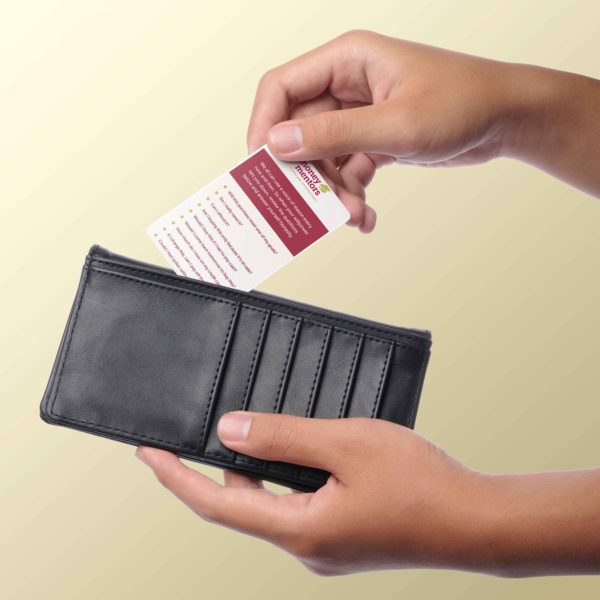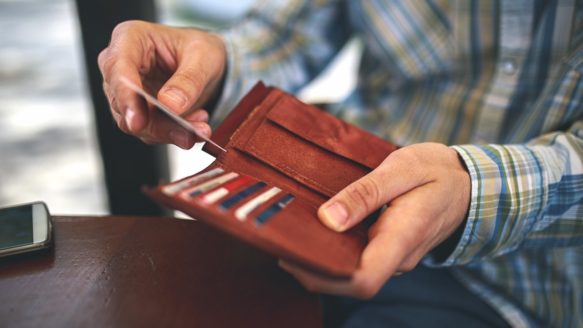
Buyer’s Remorse: How to Stop Buying Things I Regret
What is buyer’s remorse?
We’ve all been there. You’ve bought something. The initial rush of excitement has worn off, and that small nagging voice is creeping up on you: “Should I have bought that? Was it really worth the money? Could I really afford it?” These questions can signal the oncoming of deep feelings of regret after a purchase, also known as buyer’s remorse.
Regret can be a deeply corrosive and paralysing emotion. As with many negative mind states, it focuses your attention on something over which you have no control – the past. Whereas anxiety projects you into an imagined future, regret keeps you rooted in memory, leaving you feeling stuck and trapped. If you are feeling like this, don’t worry. We want to provide you with a valuable tool that can help alleviate these dark emotions.
This blog post is split into two parts. The first section is a guide from our most experienced credit counsellor on steps you can take to avoid that awful feeling of buyer’s remorse. However, we understand that you may have found your way to this post because you are already feeling deeply regretful. If you are looking for steps you can take now to help ease your regret, skip ahead by clicking here.
How to avoid buyer’s remorse

There are a number of steps you can take before making a purchase that can help to prevent buyer’s remorse. And you won’t be surprised to hear that there are already countless numbers of articles online, each with their own tips and methods on how to stop buying things you regret. So what makes this blog post different? Well, two things. First of all, we reached out to our lead counsellor Stacey Townsend AFCC BSc, who has 25 years of experience as a credit counsellor to get her valuable insight. Secondly, we have our very own downloadable resource that can help you when it comes to taking that extra moment before making a purchase.
So, here are Lead Counsellor Stacey Townsend’s tips on how to avoid buyer’s remorse:
- Wait at least 72 hours before making a purchase
- Equate working hours to the price of the item
- Avoid shopping apps and retailer email lists
- Don’t save your credit card information online
- Use cash for your purchase, not credit
- See if it fits in your budget
- Consider the “why” of your purchase
- Check the return policy
This is a very powerful method. Give yourself the time to consider the purchase. If after this time, you still want the item then you are less likely to have remorse In today’s mass-produced consumer-driven society, it’s unlikely that the product will run out. Giving yourself a moment to think can be the difference between making an informed or a rushed decision. Be very wary of companies that create a false sense of scarcity. When you see “hurry – only 3 items left”, know that this often isn’t the case.
A great piece of advice is to calculate how many hours you would have to work to pay for the purchase. Is it still worth it? With options like tap-to-pay and online shopping, the real price of a purchase is often quite abstract. Thinking in terms of working hours helps to root your purchase in reality.
This is an important one. In our last article we listed a bunch of great apps to help you save money. However, technology can be a curse as well as a blessing. If you find yourself succumbing to tempting emails and notifications, maybe it’s time to delete those apps and unsubscribe from the email lists to avoid temptation.
A simple but effective piece of advice to make you think twice about purchases is to force yourself to enter your credit card information for each purchase. The same goes for storing your shipping details. Putting that extra little bit of friction between you and the purchase is the best way to slow things down, take you out of autopilot and give you time to think through your purchase.
This one is crucial. Using cash can make you think twice about whether the purchase is worth it, and whether you can truly afford it. Buying things with credit is a very slippery slope. Avoid deep waters by only spending the money you have and perhaps think about a cash-only budget.
Budgeting is probably one of the single best things you can do for your financial situation. The first step to improving on something is to understand it. Get a grasp on your finances by writing down what’s coming in and what’s going out. Check out our popular online course Budget Bootcamp if you don’t know where to start.
This is about wants vs needs. Do you need it or is it something to make you feel better? Will the purchase truly help? Answering these questions before a purchase can help you make better decisions.
Another simple, yet powerful step to take is to check if the item can be easily returned if you change your mind. Knowing that you can take something back if you start to feel regret is a great way to alleviate some of the negative feelings that can come after a purchase.
So there you have 8 tried and true tips for avoiding buyer’s remorse, from an experienced credit counsellor who has seen it all in her 25 years of counselling.
Money Mentors Wallet Card
As well as the steps above, we also have a very handy resource for you to download.
The steps on this wallet card can provide a reminder to help you stop and think.
Download this reminder and either save it on your phone, or print it off and put it in your wallet.
When you come to make a purchase, refer to it, answer the questions and make sure you are making the right decision.

How to deal with buyer’s remorse.
OK, so you made a purchase. You feel regret. You’ve entered the dark abyss of Buyer’s Remorse. That deep crevice of shame where you can spiral further into a cycle of regret that is hard to climb out of. Let’s hit pause, take a deep breath and ask ourselves three very important questions:
- Do you want the item? (it’s ok to want the item)
- Do you need the item? (it’s ok to need the item)
- Do you still want/need the item in a week? (it’s ok if you do)
It is ok to want things, it is ok to buy things, and it is ok to return things. But, maybe you’ve bought something you can’t return. And the horrible feelings of guilt and regret won’t go away. Well, now it’s a question of your mental health. If you are experiencing negative emotion over something for which you no longer have any control, there are some other steps you can take.
- Acceptance
- If in doubt, zoom out
- Can you do anything about it?
The first thing you should always do with a negative emotion is to accept that it is there. Trying to hide or deny that you feel a certain way is just throwing more fuel on the fire. Before you know it, you’ll be feeling regretful about feeling regretful about feeling regretful. The only way to stop spiralling negative emotions is to accept them as soon as they arrive – this is psychology 101.
Don’t be ashamed about your negative emotions. Chances are they are there for a reason. What can you learn from this experience? When it comes to your next purchase, remember this feeling and look at taking the steps in the first half of this post to make purchases that you feel good about.
So, you bought something that was a bit out of your budget, maybe it was way out of your budget, maybe it’s a big problem. But let’s zoom out for a second and look at the big picture. Even with a large purchase, such as a house, chances are there are things you can do to better manage your finances and alleviate the difficulties you are going to face when it comes to paying what you owe. And if you’re reading this article, you’re in the right place. Check out some of our other money tip blogs to help. In reality, most problems have solutions. Imagine yourself in 5 or 10 years time – chances are this won’t look like such a big problem then.
The answer to this question is the key to the next steps you should take. If the answer is yes, then do what you can to solve the problem. Or better yet, reach out to one of our counsellors and let’s make a plan together for debt help.
But if the answer is no, it’s time to move on. If there is literally nothing that can be done about a situation, then there is no point worrying about it. Distract yourself, read a book, start a new series on Netflix or go hang out with friends. Learning to switch off from things over which you have no control is the centre of the bullseye when it comes to your mental health.
What now?

Hopefully you found that helpful. Whether you are looking for tips on avoiding buyer’s remorse, or you are currently feeling regretful about a purchase, we hope you have found this article to be of use.
The question of buyer’s remorse is an important one because it raises the issue of mental health and money. At Money Mentors, providing help to people experiencing these problems is part of what makes us different.
We would like to leave you with this quote from our Lead Counsellor, Stacey Townsend AFCC BSc:
“When people think of credit counsellors, they often assume that we only focus on number-crunching, spreadsheets, and budgets. And whilst those are obviously fundamental parts of the job, it’s also crucial for our counsellors at Money Mentors to provide a space for our clients to feel heard.
Sometimes it’s only a question of maths, but more often than not, our role is to listen and to understand. Everyone’s circumstances are different, and as credit counsellors we aim to create a truly welcoming space where clients can communicate without fear of judgement. After all, it is by listening to and understanding our clients’ individual situations that we can provide the most effective solutions.
If your financial situation feels like a dark cloud in your life, the best thing you can do is to book a counselling session with us. We provide free credit counselling to all Albertans, no questions asked. So, please, if you need to chat about your financial situation, that’s what we’re here for.”
To book a credit counselling session, give us a call at 1-888-294-0076 or send us an email.








